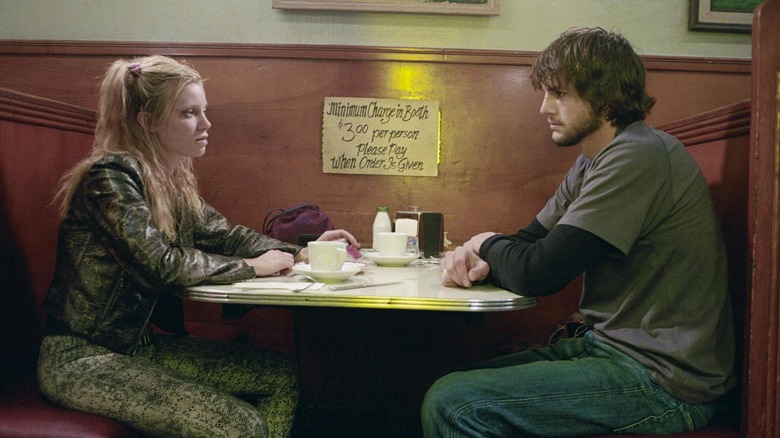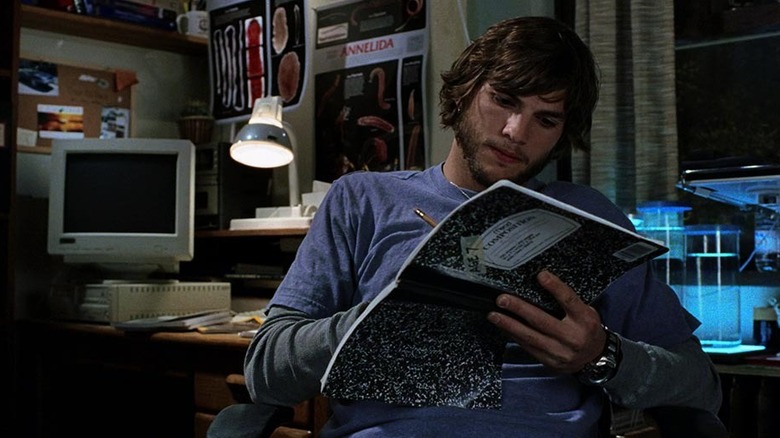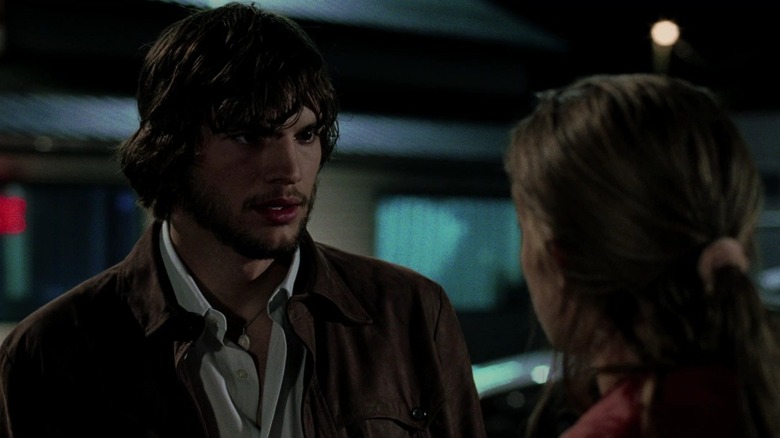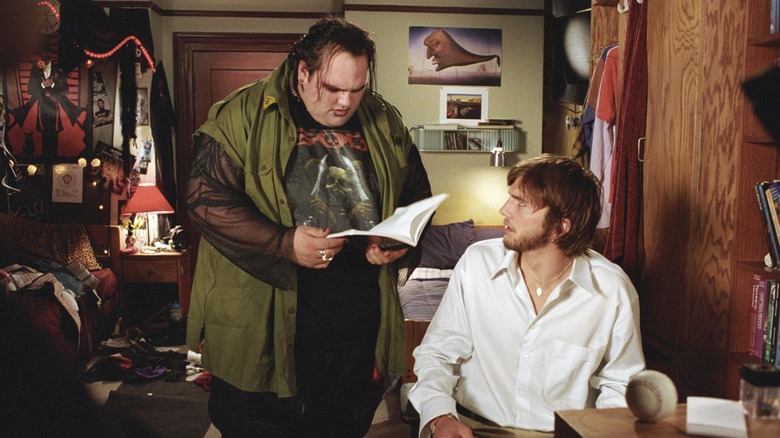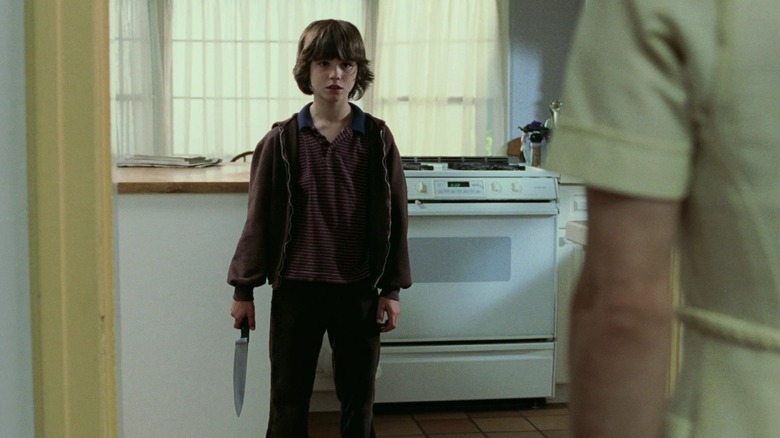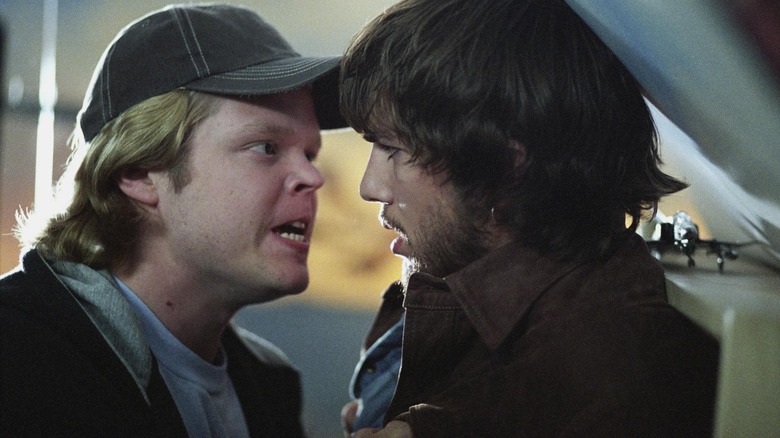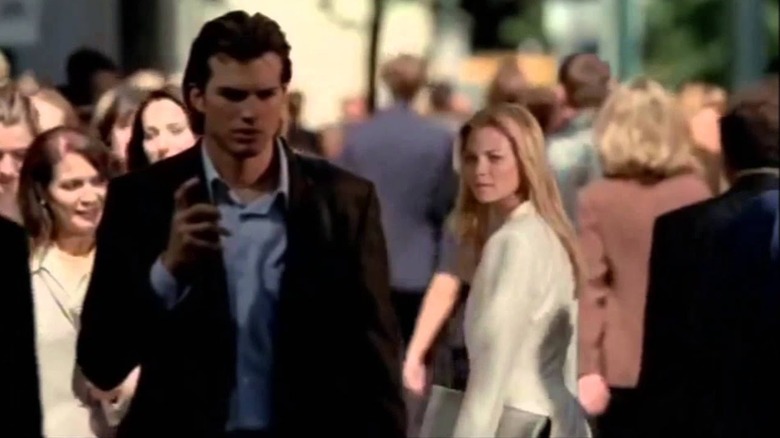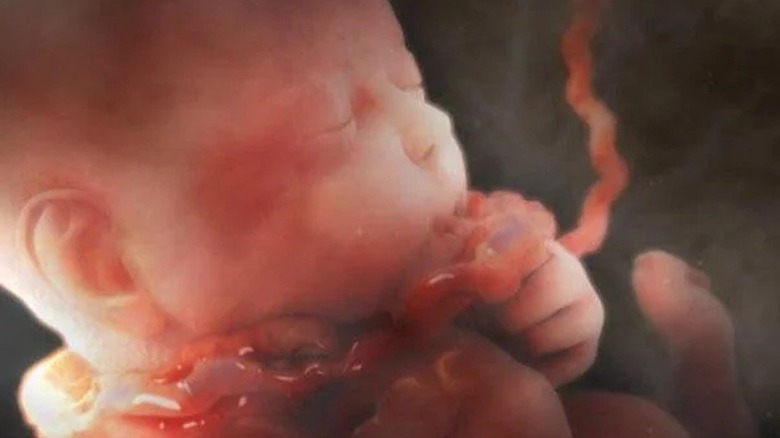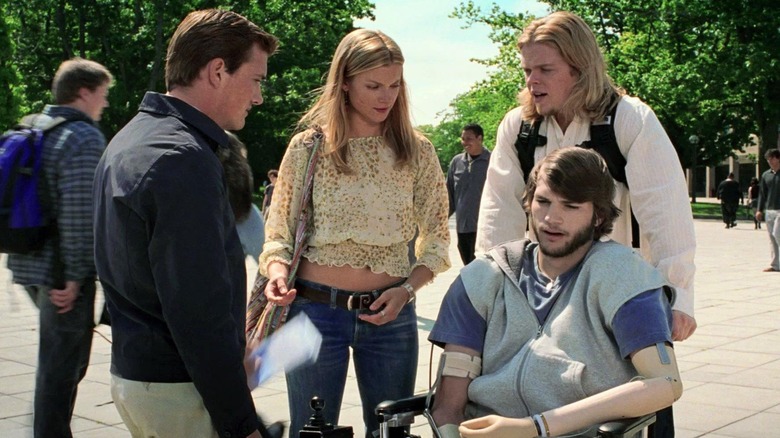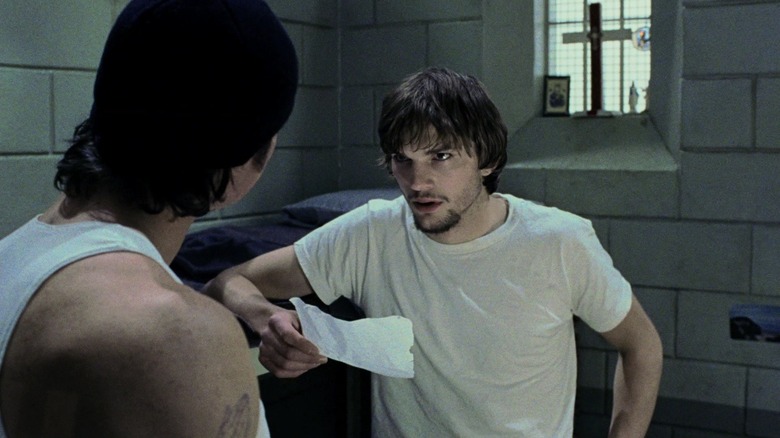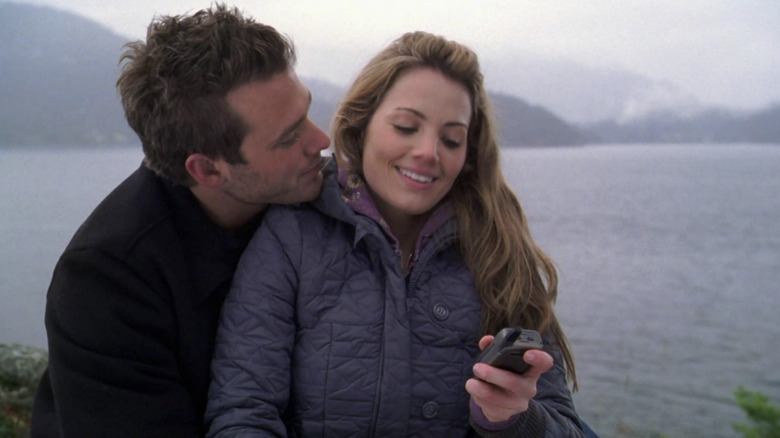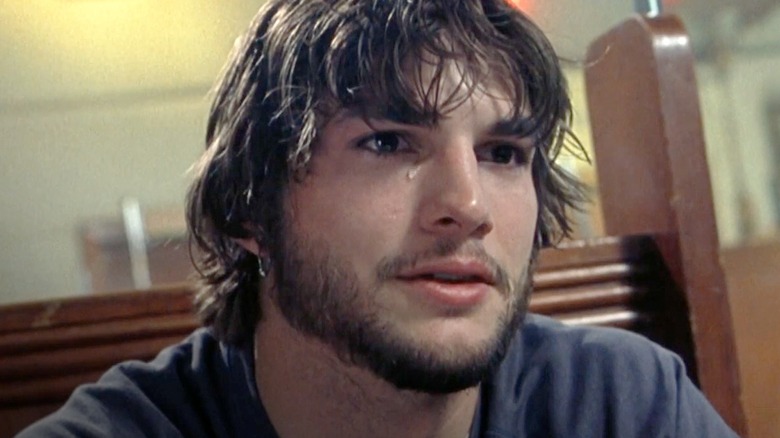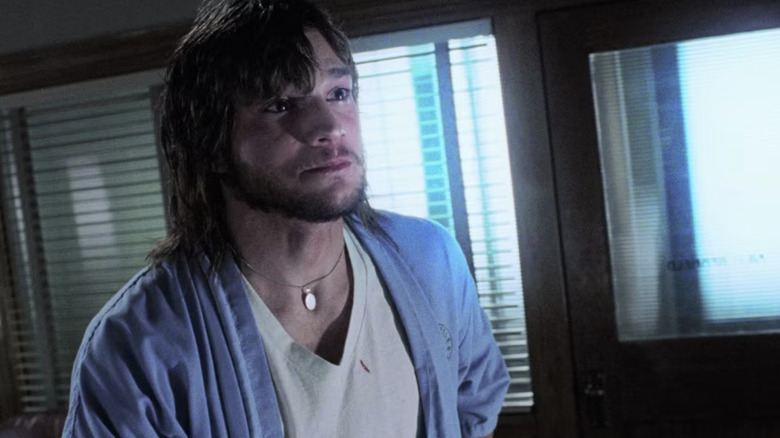We Finally Understand The Ending Of The Butterfly Effect
Hitting theaters in early 2004, just a few years after the gritty cult favorite "Donnie Darko," "The Butterfly Effect" is often part of the same conversation as the Jake Gyllenhaal-starring favorite. Dealing with similar themes of time travel and a troubled young teen, the film borrows its name from a real-life scientific theory that posits that every action we take in life, no matter how small, can and will have dramatic effects on the future. It's a heart-rending tale, and one that remains one of Ashton Kutcher's best films.
Despite the sci-fi favorite's success at the box office and popularity with audiences, it's packed with moments and plotlines that can be a bit confusing to viewers, especially with all the moving parts that make up the story — from multiple time travelers to multiple timelines. If you've been scratching your head over what, exactly, happens in the film, don't worry. Here, we take a look at what the cast and crew have had to say since its release, look at some fan theories, and even cover alternative endings that dramatically alter the film's tone with just a few scenes.
What you need to remember about the plot of The Butterfly Effect
In "The Butterfly Effect," we meet Evan Treborn (Ashton Kutcher), a young man on the run who is currently in a mental hospital. We then flash back to Evan's childhood and quickly learn that his formative years were none too pleasant. A seemingly psychotic father left him to grow up in a broken home, while his best friend Kayleigh (Amy Smart) deals with a dad (Callum Kieth Rennie) who is even worse, sexually abusing her and her brother Tommy (William Lee Scott). Understandably, Evan and his friends find themselves experiencing the effects of childhood trauma as they grow older, while Evan suffers from mysterious blackouts during some of these horrific events. By college, Evan has spotty memories of some of his life's most pivotal moments.
Thankfully, Evan kept meticulous journal entries throughout his life, and after he revisits one while in college, he learns he has the otherworldly ability to visit past moments in time, but only while reading their corresponding journal entries. Armed with this newfound power, he sets off on a mission to try to right the wrongs of his past in an effort to ensure a happy future for both himself and Kayleigh. But he soon learns that fate has other plans, with each attempt to create a better present resulting in unforeseen and often horrific consequences.
How the Time Travel Rules Work in The Butterfly Effect
Time travel is, by its very nature, a tricky concept to work with. Even the best films to tackle it can leave audiences with more questions than answers and are sure to make your head spin if you try too hard to dissect the logic. That said, "The Butterfly Effect" does a pretty good job of following the rules it lays out for Evan to follow.
As its title implies, making one decision in the past can have profound and cascading effects on the future, which can wind up changing someone's life for the better or, worse, create an entirely new timeline of events. Evan spends much of the film fighting the consequences of his actions while the cosmic forces of fate play out to their own set of unflinching rules. Just as important as what happens if you mess with the past is how you get there, making perhaps the most crucial rule in "The Butterfly Effect" the way Evan is able to go back in time to begin with.
It's established early on that his power is wholly dependent on his childhood journals. Every page serves as a key, opening the door for him to step back into that particular moment in time. But he also learns that he can use photographs or even home movies to jump back as well.
What Happened At The End of The Butterfly Effect
By the end of the film, Evan's changes to the past result in unintended consequences that have left his present in shambles. He finds himself hospitalized, with doctors claiming he suffers from delusions, suggesting that everything we've witnessed up until this point may all have been in his head. It's a claim that almost seems believable, especially when it's revealed that there's no way for Evan to simply remake this timeline by reading his journals — because they don't exist in this altered timeline.
With nothing left to lose and his friends' lives still up in the air, Evan sets out on an all-or-nothing gamble: trying to revisit the past by watching an old home movie from his childhood. It works, giving him one last shot at fixing what he broke, but not without paying a heavy price.
Evan's final trip to the past takes him back to the childhood birthday party where he first met Kayleigh. It's there that their paths became intertwined, and it's only because they met that so much bad has happened. Kayleigh continued to live with her abusive father to stay close to Evan, and the subsequent incidents involving an exploding mailbox and the murder of Evan's dog only happen due to their friendship. With that in mind, Evan makes the painful decision to violently threaten Kayleigh at the party, resulting in a new timeline where they never become friends. He sacrifices his own happiness to ensure hers.
Explaining all of Evans childhood blackouts
Arguably the most important part of "The Butterfly Effect" is Evan's childhood memory loss and, by extension, how this tie into his ability to change the world around him. We learn early in the film that Evan suffered blackouts as a child that went wholly unexplained, but by the end of the film, we get a good idea of what really happened. It's no coincidence that his childhood self has convenient blackouts during critical moments; every time Evan suffers memory loss, it's because he isn't in control of his own body. At least, not at the time. Instead, every time a blackout occurrs, it's because his future self is occupying the body of his past self, effectively creating a block between his actions and his ability to recall them.
The strange drawing he doesn't remember making in school is actually the result of his older self doodling his violent fantasy against Kayleigh's father. The moment when his mother caught him with a knife was his older self attempting to disarm a stick of dynamite that killed a neighbor when he was young. Some of these moments Evans revisits multiple times, rewriting his own history over and over in the hopes of making things right. There are plenty of other details in "The Butterfly Effect" that you might only notice when watching it more than once, too.
What did the ending of The Butterfly Effect Mean?
At its core, "The Butterfly Effect" is a film about destiny and one man's desperate attempts to fight fate. Evan's rebellious run begins after his childhood friend Kayleigh — who he'd lost touch with years earlier — takes her own life. Unwilling to let that outcome stand, Evan travels through time, intending to undo the traumas they all suffered as children and hoping to create a new timeline where they're happy and in love.
No matter how many times he tries to save Kayleigh by changing the past, though, things only get worse. It's only when he stops attempting to manipulate history for his own ends and takes the most selfless route — sacrificing any hope of a relationship with Kayleigh — that he's able to beat the odds. Satisfied that he's finally found a path that's best for everyone, Ethan burns his journals to ensure he's never tempted to time travel again. In a final scene, Evan and Kayleigh pass each other on a busy city street, recognizing each other briefly before going their separate ways.
But the film's final act does more than conclude Evan and Kayleigh's story; it sheds light on how Evan acquired his powers. In his final meeting with his father, it's revealed that he inherited the powers from dear old dad, and that's why his father has been institutionalized all his life. It's a fate that very nearly caught up with Even as well, had he played his cards differently.
More alternate endings appeared on the home video release
It's only fitting that a movie like "The Butterfly Effect," which asks what it would be like if someone could change the future, would have multiple alternate endings. Revealed on the initial home video release, the first is a familiar scene, where Evan and Kayleigh are both walking on a street in New York City. They pass each other by, only for Evan to pause for a moment, presumably a preamble to rekindling their lost connection, suggesting they may indeed have a happy future together.
A second alternate ending begins much the same way, but instead of implying another chapter of Evan and Kayleigh, we watch them meet for the "first" time and plan a date. Admittedly, both of these endings are pretty close to what we actually got in the theatrical cut of the film. The key difference is that whichever of the two alternate endings you choose to make your head canon, or even if you go with the film's official conclusion, they all can be considered to be relatively positive. But the same can't be said for the truly grim alternate ending that awaited viewers of the film's director's cut.
The darkest ending to the Butterfly Effect
As you may recall, "The Butterfly Effect" ends on something of a bittersweet note. After making repeated journeys to the past and multiple painful trips through alternate futures, Evan makes the difficult decision to do what's best for Kayleigh, even if it means that the two will never get to know one another. Years later, they pass each other on the street by total chance but ultimately keep walking, showing us that they'll remain strangers.
But one alternate ending would've marked the end of Evan's story before it even began, and on a far darker note. Featured in the director's cut of the film, Evan's final trip to the past goes as far back as possible, to the very moments before his birth, thanks to a home movie of his mother's delivery.
It's here that Evan makes the ultimate sacrifice, strangling himself on his own umbilical cord to ensure he never crosses paths with Kayleigh or anyone else, preventing the destructive results that would have followed his birth. It's a harrowing ending that might have been a bit too grim for a theatrical release, and it's not the only dark scene unique to the director's cut. Another deleted scene has Evan's mother, Andrea, tell him her previous children also died in the womb. This implies that he isn't the first to go down this dark path and that her previous children also inherited similar time travel abilities, only to ultimately make the same decision of self-sacrifice.
What the cast of the Butterfly Effect has said about the ending
The ending of "The Butterfly Effect" led to lots of discussion, and it wasn't just fans and critics trying to make sense of it and explain it. The cast, too, including star Ashton Kutcher — then a superstar thanks to small screen hits "That '70s Show" and "Punk'D" (though he doesn't get many movie offers today) — had their own thoughts on what the ending means.
In an interview with IGN, Kutcher got right to the point in explaining how he interpreted the film's overall message. "It's a metaphor that we are kind of blind to the moment that we live in ... I think that, as a society in general, we close our eyes to these things that happen." More than a story about changing the past, Kutcher explained that the film is just as much about the hidden horrors that persist beneath the surface. "There are kids that are being molested. It happens. It's real. And that, these kinds of things go on and, in the same ways that my character blocks out these moments, we as a society, in many ways, block out that this stuff happens."
What the director of The Butterfly Effect has said about the ending
Four different endings may seem excessive. One might assume that the writer was unsure how to end "The Butterfly Effect," so the director shot several options to choose from — but that's not exactly how it went down. Instead, it was the studio that was unhappy with the ending the director had in mind — the finale where Ethan ends his own life in the womb — and the producers insisted on creating a more "upbeat" version.
Two decades after the film's release, directors J. Mackye Gruber and Eric Bess opened up in a joint interview with The Ringer about their displeasure with the ending shown in theaters. "I was quite upset at the moment," Gruber told the outlet. "I was so mentally attached to that baby ending." So who actually came up with the twisted ending in the director's cut?
"I think it was your girlfriend," Gruber said to Bress. Referring to it as the "anti–'It's a Wonderful Life,'" the pair recalled that they wanted an ending that would make the audience stop and think rather than simply rush out of the theater cheering. "You're young and you're being a little punk rock, and at the end of the movie, the audience is gonna sit there and go, 'Don't talk to me. I need to absorb what I just saw.'"
Does the ending of the Butterfly Effect set up a sequel?
Though "The Butterfly Effect" ends in a pretty conclusive way, with Evan leaving his old life behind for something new, it's still open-ended enough to leave room for a follow-up movie. After all, even though he destroyed his preferred method to reach the past by burning the journals, Evan still possesses the ability to travel through time via videos and photos. But while two sequels were released in 2006 and 2009, respectively, they sadly have almost no relation to Kutcher and Smart's 2004 original.
"The Butterfly Effect 2" (helmed by "Annabelle" director John Leonetti) follows Nick Larson (Eric Lively), a young man who discovers he has time-traveling powers in the wake of his girlfriend's death. They're similar to the ones we saw Evan Treborn use, relying on photos instead of the written word to traverse through the past. The similarities don't stop there, as the film unfolds in much the same way as the franchise's initial movie.
The final entry in the trilogy is a major departure from the series' previous installments and features a new protagonist trying to solve a murder from his past. He soon discovers that the killer is still out there and must evade being arrested as the cause of a growing pile of bodies. Again, it's a huge change from the tone and plot of the original.
How the ending of the Butterfly Effect split fans and critics
While it's hard to say that "The Butterfly Effect" ranks up there alongside classics like "12 Monkeys" or "Back to the Future," it's a solid pick for audiences looking for a story with a decidedly human touch, and it did earn a spot in our list of 55 best time travel movies. The film proved to be contentious, however, with critics and audiences remaining divided on the sci-fi flick, particularly when it comes to the ending.
The film's largely positive audience scores stand in stark contrast to its bleak critical reviews, with outlets like the BBC describing it as "stylish, idiotic, and comical – for all the wrong reasons." Some were even more harsh, with Salon essentially calling the movie tone-deaf and comparing the viewing experience of the film's ending and final themes of love to "receiving a box of Valentine's chocolates in which someone has deliberately hidden ground glass."
Other, more lukewarm reviews, such as the one published by top reviewer Roger Ebert, felt that the film had overstayed its welcome by the ending, stating, "There's so much flashing forward and backward, so many spins of fate, so many chapters in the journals, that after awhile I felt that I, as well as time, was being jerked around."
Fans have plenty of theories about the end of The Butterfly Effect
"The Butterfly Effect" remains an enduring topic of discussion for sci-fi lovers, in large part because its alternate endings have given fans plenty to talk about in the two decades since its release. The various potential timelines, as well as the decision Evan makes to finally save the day, mean there remains plenty to speculate on.
A fan theory posted on Reddit, for example, wonders if Evan was already pretty close to a solution the first time he tried to alter the past. That attempt ended in failure, since after he convinced Kayleigh's abusive father to leave her alone, he instead directed his abuse towards her brother Tommy. But what if Evan had convinced him to leave both of his children alone? It may have just stopped Tommy from trying to murder Evan as an adult and resulted in the happy ending he was trying to achieve for everyone.
A similar Reddit theory argues that instead of taking the approach of alienating Kayleigh to save her, the best decision would have simply been to do nothing — in the past, at least. The idea is that because Evan suffered from memory loss even before we see his first trip to the past, it's possible he'd already tried to change things and had settled on the reality we first see as the best one. This theory is not without its flaws, but it does illustrate just how deep "The Butterfly Effect" can go.
